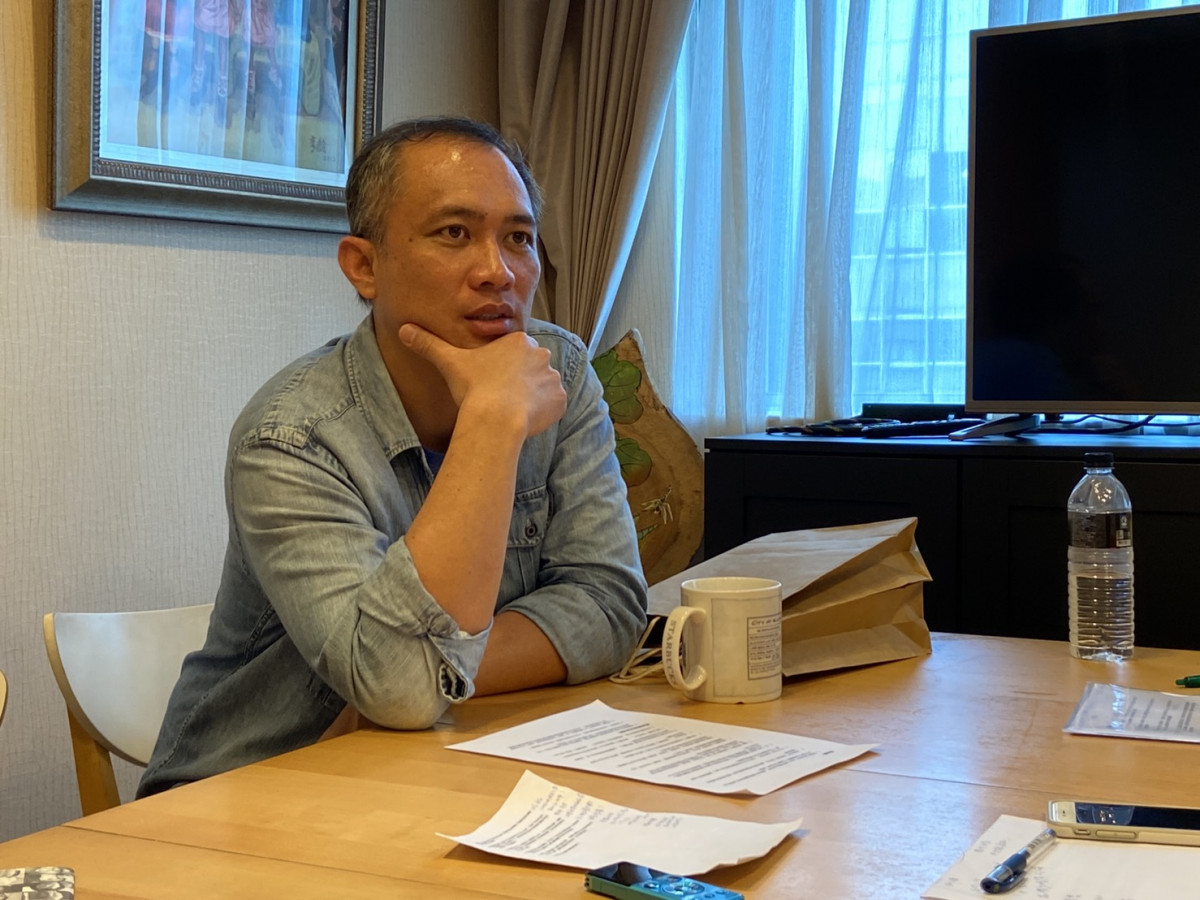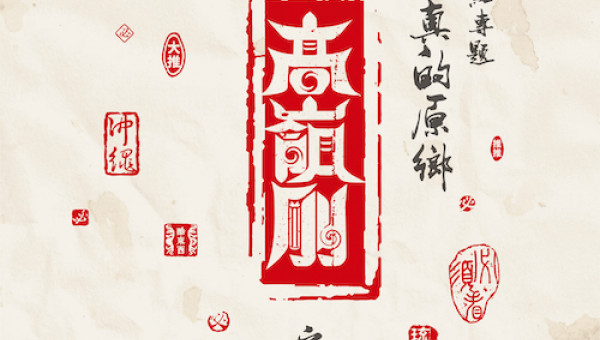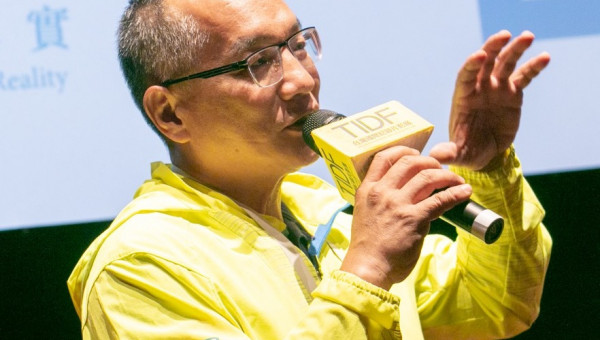
You moved away from the community with your family and settled in Taipei when you were a child. When you were young, did your parents teach you the mother tongue or talk about your people?
One of my childhood photographs left a deep impression on me. In that photograph, my mom was teaching me Bopomofo (Mandarin Phonetic Symbols). Instead of teaching me our own culture, she wanted me to learn Mandarin Phonetic Symbols before I ever attended school. Both of my parents are construction workers. Their greatest wish is to let me receive a good education and avoid the toil they went through. Learning about our culture is not my parents' top priority because it only makes a little money.
I think theirs was the generation of cultural rupture. It’s a bit like the history of Taiwan, the change from agriculture to industry, and then the migration to the cities. Indigenous peoples were caught up in that wave too. My parents didn't think about going back to the community. They retained the language and the food, but there was no sense of a complete culture.
At that time, government policies and education wouldn’t stress that it was a good thing to be Indigenes. Multiculturalism was not the mainstream. WU Feng's story[1] was still in the textbooks I studied. Indigenous students can admit to the university with the help of ‘bonus points’ that was very painful for me. I felt like I was doing something wrong, enjoying special privileges. A poor grasp of my mother tongue and the policy bound me up, so I became an angry youth in my freshman year at the university. I discovered that the first 20 years of my life was taken in by the government. I was enraged; I wanted to find what had been lost.
Angoo (1999) was the work you applied for admission to the Tainan National University of the Arts’ Graduate Institute of Studies in Documentary & Film Archiving. After filming it, you said it let you realise what 'camera violence' is. Can you share specifically on that?
Application closing date was right after the Lunar New Year and I had to turn in a completed work. For someone who’s never done any filming and isn’t sure what documentaries are, the quickest, most convenient subjects are those found closest to you.
When I was editing the last part [of the film], I didn’t think there’s anything wrong with my younger sister’s crying, but later I looked at it more objectively, and I felt uncomfortable with it. I knew I’d tried to make her cry when filming because it would be more appealing to audiences. After filming Angoo, I never again wanted to make my subjects feel uncomfortable; I didn’t want to pry into someone’s privacy that way. I began to avoid filming my family.
Looking for the Salt (1999) is a film about an on-campus Indigenous students club. When the students took part in a mother-tongue speech contest, a judge said, ‘Although they’re speaking Indigenous languages, there’s no taste of salt.’ How did you feel when you heard that?
I knew it would be the idea of the film’s title at that very moment. It pointed out our pain and plight as urban Indigenous students, who hadn’t lived with their people for a very long time. We had been searching for tradition and trying to imitate the villagers, but it seems all the work is for nothing. Those days I felt in filming them as if filming myself because their experiences were the same as mine. As a documentarian, I often describe it like this: The camera is aimed at others, but when you’re filming others, you’re often filming yourself. We’re merely using other stories to tell our own.
As an urban Indigene, are your perspectives in filmmaking different from that of other directors? Can you give us an example?
Yes, it certainly is. Before I joined the Dulan's Kaput[2], I didn’t see things from an Indigenous perspective but the angle of an urban Indigene. When I was filming Looking for the Salt, what moved me most was the mother-tongue speech contest. But that probably wasn’t what moved the community. They probably felt there was no need to compete for because the students all spoke so badly. But that was our experience.
Watching Looking for the Salt now, I feel it was leading to something, forcing me to return to the community. From the completion of Looking for the Salt to going back to the tribe to learn the culture, for more than ten years, I think it's easier said than done. If the Pangcah elders want to judge whether you’re a good member of the community, they look to see if you ‘less talk, more action’. For the villagers, a lot of the Indigenous elites only talk; they’re gifted speakers, but they’ve done very few.
You mentioned that after joining the Dulan’s Kaput, you no longer feel you’re adrift in life, and grasped indigenous sovereignty. Can you talk about the process?
After that, I was stable as an anchored ship, no longer adrift. When others ask me if I’m a Pangcah, or if I know what Pangcah is. I gradually grew more confident; I don’t need to say or wear something on purpose to prove my identity. I used to talk much to cover up what I was saying because I wasn’t sure if it’s correct.
I became aware of 'diversity' and was able to accept it. In Taiwan, the central government has officially recognized 16 Indigenous peoples. Their lifestyles and languages are very different from one another. The category of Pangcah people is even more complicated. The Pangcah community can be seen as a nation, because their lifestyles are not all the same, even though they live in the same village just across the mountain or the river.
My works are few, so it’s difficult to conclude which one was influenced by the Dulan Kaput. But I believe my next films are affected by Dulan Kaput. In my feature film, I’ll add the elements of indigenous culture, such as casting Indigenes in the roles and addressing indigenous issues.
You once said you wanted to make a Pangcah musical.
I don't insist my works deal with Pangcah or other Indigenous groups.
The film is a world of unlimited possibilities. I want to tell stories with my perspectives and find subject matters, and lastly see if there are indigenous issues that can be added to my film.
I still want to make a Pangcah musical, which story has taken shape. But it’s harder to carry out when gaining a much clearer understanding of the indigenous culture and filming. I'll make it until we have sufficient resources and funds. If there’s a chance to bring the Pangcah story onto the stage, it probably will be my last work.
Date: May 11th, 2020
Place: Wonderful Time Film Production
Interviewers: LIN Yu-ching, CHAO Yuan, Jimmy HOU, Frances Tz-in LIN, WANG Yi-lan
Editors: LIN Yu-ching, CHAO Yuan
[1] WU Feng was a nineteenth-century Han Chinese businessman. According to legend, he sacrificed himself to persuade Indigenous peoples to give up the practice of headhunting. During the martial-law period, schoolbooks presented him as a hero, an example of the ‘civilizing’ influence that Han Chinese had on Taiwan’s indigenous population. The culturally insensitive story has since been removed from textbooks.
[2] According to the Pangcah system of age classes, the Kapah (young people) is responsible for the public affairs of the village. (Source: https://reurl.cc/Q3R4Q2, https://reurl.cc/r89LOb)



